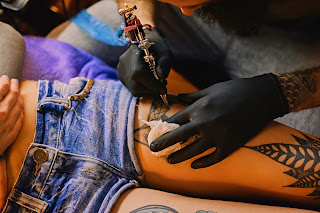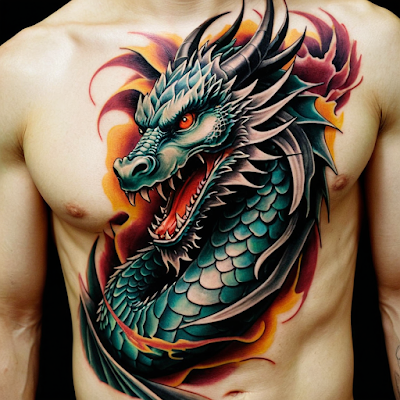The Cultural Significance of Body Art: From Ancient Traditions to Modern Trends
Body art has transcended time and geography, serving as a universal form of expression that reflects the rich tapestry of human experience. Tattoos, in particular, have played a significant role in various cultures, showcasing the diversity and depth of their meanings. This article delves into the cultural importance of tattoos, highlighting their symbolism, traditions, and the ongoing trends in the world of body art.
Body Art as Cultural Identity
For centuries, body art, especially tattoos, has been a powerful medium for expressing cultural identity. Various cultures around the world have used tattoos to signify tribal affiliation, lineage, and social status. Indigenous communities in places like Polynesia, Africa, and the Americas have utilized tattoos as markers of identity. Each design carries profound meanings, representing connections to ancestors, spiritual beliefs, and important life events.
For instance, in Polynesian cultures, tattoos often reflect a person’s journey and their relationship with their heritage. These intricate designs, known as "tatau," signify a deep connection to one’s ancestry and the spiritual realm. Similarly, the significance of a dragon tattoo in many Asian cultures embodies strength and good fortune, reflecting not only personal beliefs but also communal values.
Symbolism and Tradition
Tattoo designs are rich in symbolism, often mirroring the values, myths, and stories of their respective cultures. In Japanese body art, known as irezumi, designs like koi fish, cherry blossoms, and dragons are steeped in meaning. For instance, koi fish represent perseverance and strength, while cherry blossoms symbolize the fleeting nature of life, aligning with the Japanese philosophy of embracing the moment.
Another remarkable tradition is the Maori tattooing practice called ta moko. The intricate patterns of ta moko convey essential aspects of an individual's genealogy and social standing. Each design is unique, telling a personal story that connects the wearer to their culture and ancestors. Understanding these symbols enhances our appreciation for body art, revealing the cultural narratives they encapsulate.
Rituals and Ceremonies
The practice of tattooing often involves significant rituals and ceremonies, marking important milestones in life. Among the Dayak people of Borneo, the berinjan tattooing ceremony celebrates coming-of-age, marriage, and warriorhood. This process is not merely about the tattoo itself; it fosters community bonds and a sense of belonging among participants.
Similarly, many cultures have ceremonial practices around body art, including face painting, which often accompanies special events or festivals. These rituals serve to reinforce cultural identity and communal ties, illustrating the powerful role body art plays in personal and collective narratives.
Revival and Reclamation of Ancient Traditions
In recent years, there has been a renewed interest in traditional tattooing practices as indigenous communities strive to reclaim their cultural heritage. Various organizations and artists are dedicated to preserving these ancient traditions, creating platforms for cultural exchange and education. Tattoo festivals and workshops are now common, allowing artists and enthusiasts to explore and celebrate diverse body art forms.
For example, some tattoo artists are integrating ancient techniques into modern designs, showcasing the beauty of traditional body art while making it relevant for today's society. This revival is crucial for ensuring that these practices continue to thrive and are passed down to future generations.
Contemporary Expressions of Body Art
Today, body art is evolving continuously, merging traditional designs with contemporary aesthetics to create innovative forms of expression. Modern tattoo artists draw inspiration from a broad spectrum of cultural motifs, resulting in unique and hybridized tattoo styles that resonate with various lifestyles.
The intersection of trend fashion and body art is particularly evident in how tattoos are now seen as an extension of personal style. Celebrities and influencers have popularized body art, making it a prominent aspect of modern fashion. This shift has led to a greater acceptance of tattoos in mainstream culture, allowing individuals to express themselves boldly through body art.
Moreover, tattoos can serve as a canvas for storytelling. Each tattoo can represent a personal experience, belief, or significant moment in life, making them deeply personal yet universally relatable. The art form encourages individuals to embrace their stories and share their identities with the world.
The Future of Body Art
As we look to the future, the significance of body art will likely continue to evolve. With ongoing globalization, cultural exchange will further enrich the landscape of body art, blending diverse traditions into new forms of expression. This trend not only celebrates individual identities but also fosters mutual understanding and appreciation among cultures.
In the context of lifestyle, body art will remain a crucial element for many people, serving as a means of self-expression and cultural connection. Whether through a dragon tattoo, intricate tribal designs, or vibrant face painting, body art will continue to be a vital form of communication that transcends words.
Body art, particularly tattoos, carries a wealth of cultural significance, reflecting the identities, traditions, and values of diverse communities. From ancient practices to modern trends, tattoos serve as visual narratives that tell the stories of those who wear them. As we explore the meanings behind these designs, we gain a deeper understanding of the rich tapestry of human experience that body art represents.
By embracing and appreciating the cultural significance of tattoos, we not only honor the past but also pave the way for future generations to continue this vibrant tradition. Whether you’re considering your first tattoo or simply exploring the world of body art, remember that each design is more than just ink on skin; it is a story waiting to be told.





Comments
Post a Comment